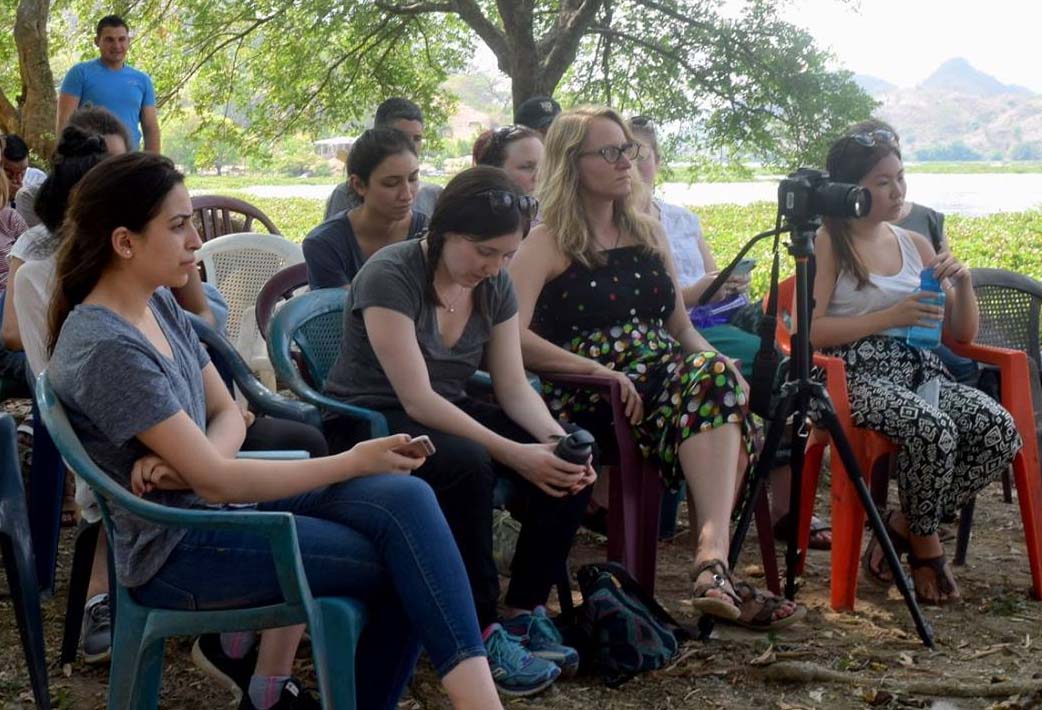By Tanya Sahni & Erica Wallis
On February 28th, Amanda Grzyb, associate professor of Information and Media Studies at Canada’s Western University gave a talk as part of an ongoing public interest lecture series, bringing the anti-mining struggle of El Salvador to the Canadian north with an informative presentation.
 In a local library, a crowd gathered to learn about the environmental crisis in El Salvador and Salvadoran efforts to protect precious water resources from transnational mining companies. Having just returned from overseeing an international delegation in El Salvador herself, Grzyb was able to show her audience video footage of Salvadoran community leaders speaking about their ongoing struggles. Bringing the words of community leaders directly to a Canadian audience proved a powerful experience for those watching, and a passionate discussion followed the presentation. The audience was composed of a diverse group of students, professors, and many members of the local community. Also present at the talk were several members of the international delegation that had observed a referendum on mining in the community of Cinquera the previous week, as well as the Director of SalvAide, Alfredo Marroquin.
In a local library, a crowd gathered to learn about the environmental crisis in El Salvador and Salvadoran efforts to protect precious water resources from transnational mining companies. Having just returned from overseeing an international delegation in El Salvador herself, Grzyb was able to show her audience video footage of Salvadoran community leaders speaking about their ongoing struggles. Bringing the words of community leaders directly to a Canadian audience proved a powerful experience for those watching, and a passionate discussion followed the presentation. The audience was composed of a diverse group of students, professors, and many members of the local community. Also present at the talk were several members of the international delegation that had observed a referendum on mining in the community of Cinquera the previous week, as well as the Director of SalvAide, Alfredo Marroquin.
The lecture focused on three main topics: the toxic legacy of the San Sebastian gold mine in the department of La Union, the looming threat of at least 28 mining concessions across El Salvador (particularly the proposed El Dorado mine in Cabañas), and the aggressive strategy used by multinational mining corporations that utilize provisions in trade agreements to sue countries that prioritize environmental protection and human rights over corporate profits. Dr. Grzyb took the audience through an explanation of the population density of El Salvador and the various environmental challenges that face the country – including poor water quality, deforestation, and over-use of agro-toxics -- before turning to a brief history of the political struggles that have affected the country. She also mentioned Pacific Rim/OceanGold’s $301M lawsuit against the country of El Salvador, which the company lost in October after a seven-year battle. With this context, she provided the audience with a better understanding of the complex contemporary challenges facing El Salvador and environmental activists who live there.

Although mining is one of Canada’s primary industries, many Canadians are unaware of the impact that mines can have in the global south, especially in Latin America. This makes public education of this kind even more important in Canada, where people may identify more with the owners of mining companies than the communities their mining projects directly affect. During the question period, two self-identified representatives of GoldCorp in the audience voiced their objections to a perceived bias in Dr. Grzyb’s presentation. When another audience member, Michael Klug, asked one of the GoldCorp reps if Salvadoran subsistence farmers should accept the El Dorado mine in their community, he backed off and said, “no,” while still extolling the general virtues of the gold mining industry.
It was clear from the animated discussion in the room – and outside in front of the library -- following the presentation that most of the listeners had absorbed valuable information about the mining issue in El Salvador. Some people had even expressed interest in joining the next delegation to El Salvador this summer, when there will be a sixth community referendum on mining. With similar public education opportunities, there is hope that Canadians can better understand the struggles of Salvadoran environmental leaders, ultimately fostering the growth of truly global citizens.
